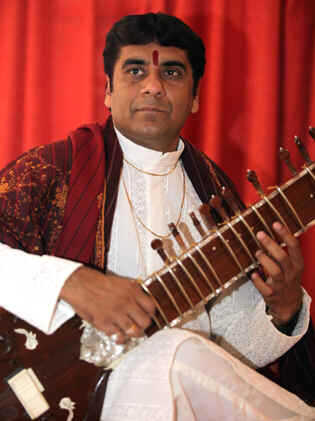Romesh Bakshi
With the strings of his sitar, Raj Kumar Dogra, a sitar maestro, can curb the suicidal tendencies of a person, can cheer a depressed person admitted in a hospital and can even help in giving a bold uplift to the faces of those ‘suffering from chronic ailments. Such is the magic effect of meditation music therapy, claims Raj Kumar Dogra the sitar maestro hailing from Jammu.
Meditation guru and sitar music therapist authoritatively claims that meditation music therapy is a natural way of curing ailments. Dogra who is a professional sitar player, musicologist and meditation music therapist besides a researcher, underlines that on the basis of his research in eradicating various vices like addictions, psycho-social problems and many other diseases from society, it has been established that sitar music therapy is more effective than medicine.
He points out that Indian classical music therapy is a universal language and a mystical cradle for comforting and achieving the balance and harmony of body, mind and the eternal. Music being considered divine to sooth human soul since times immemorial has undoubtedly a healing touch, he asserts.
As a professional sitar player, musicologist and meditation music therapist besides being a researcher, I firmly believe that Meditation music theranv hesidc its innumerable advantages is the shortest way to God, says Dogra. I claim that meditation music therapy is more effective to boost morale of ailing humans to face the diseases boldly.
Further he opines that music therapy also helps in reducing anxiety, stress and pain by boosting emotional and physical well being. It also increases concentration level and maintains emotional equilibrium, reduces frustration and helps keep mind sound and stable. It is a proven fact that whenever any individual is not in a good mood or is depressed, he/she just switches on the radio or CD player to soothe his/her disturbed soul. ‘The mystical power of music could even be read in epics not only related to music but also related to therapy.
Modern science and medicines have discovered the healing power of music, he said, adding that it has recognized the importance of treating persons in need of mental and physical health uplift, rehabilitation and special education.
Replying to a query about what made him to become a meditation music therapist, Dogra recalls that his personal experiments as a sitar music therapist have compelled him to claim that classical music can go a step beyond and convert a disturbed mind into a perfectly peaceful one. Recalling his experiences in London where he had set up a Swàrangan Meditation Centre, Dogra narrated that he virtually has seen miracles and remarkable changes in pregnant women, diabetics, psychiatrics, arthritis, blood pressure and heart patients individually while many a time he had been called by the NGOs, societies and health institutions to perform for their patients. He also adds that even in Jammu he had performed at hospitals, jails for Army personnels etc.
He maintains that since the music therapy re-discovered its significance in comforting humans, the researchers too are finding that music may be an effective balm for many other afflictions like the isolation of conditions such as autism and Alzheimer’s disease, the disability that results from stroke, the physical stress of entering the world too early.
“The hope of music’s curative powers has spawned a community in the United States of some 5,000 registered music therapists, who have done post-college study in psychology and music to gain certification. Active primarily in hospitals, nursing homes, special need classrooms and rehabilitation units, music therapists aim to soothe, stimulate and support the development or recovery çf abilities lost to illness or injury, he recalls from his experiences during his visit abroad.
He adds that while music therapists use a mix of improvisation and proven techniques to help patients the experts especially neuroscientists are looking to uncover the scientific basis for music’s healing powers.
“Pitch, harmony, melody, rhythm and emotion all components of music engage different regions of the brain and many of these regions are also important in speech, movement and social interaction. If a disease or trauma has disabled a brain region needed for such functions, music can some times make a back door entry and coax the ailments out via another route, Dogra says.
‘In a sense, music therapists are using musical tools to particularly engage certain parts of the brain and then teach the brain new tricks and tools to overcome impairment,” he opines.
Dogra a Gold Medalists from Jammu University has many national and international awards and fellowships to his credit including Harikrishan Das Kewal Krishan Trust Fellowship; International Foundation for Fine Arts Award; Swarsadhana Award; Pandit Bhaskar Award; Trimurti Sangeet Mandal Puraskar, Sangèet Research Academy Awards etc.
Summing up Dogra attributes his present name and fame to his master renowned Sitar maestro of India, Pandit Arvind Parekh associated with the Gharana of world renowed Sitar Maestro Ustad Vilayat Khan and his parents.
Trending Now
E-Paper


